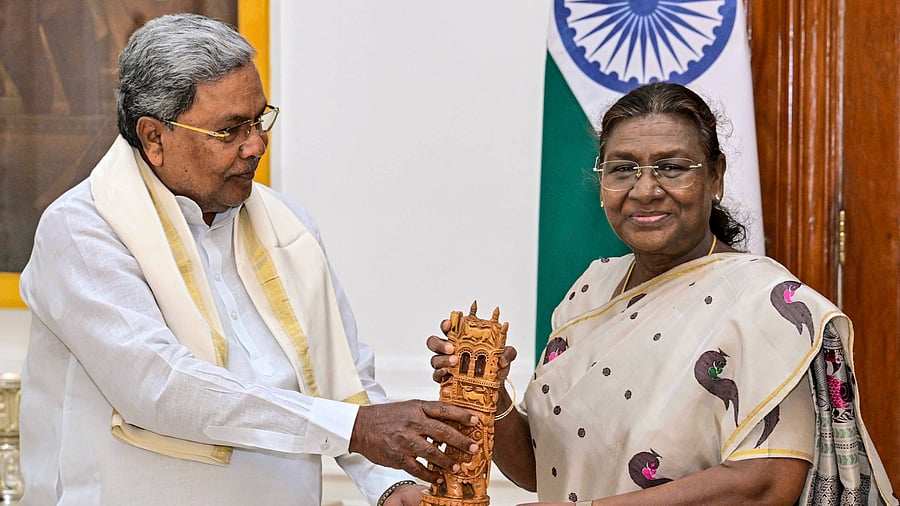
Chief Minister Siddaramaiah and President Droupadi Murmu
Credit: PTI Photo
Karnataka Chief Minister Siddaramaiah’s recent visit to the Rashtrapati Bhavan, seeking assent for seven long-pending bills is a grim reminder of the systemic dysfunction that plagues Centre-state relations today. It is a travesty of federal democracy that a duly elected chief minister should personally plead for what should be a routine constitutional formality. The bills in question, which pertain to reforms in education, mining taxation, transparency in public procurement, administrative reforms, and endowments, have been languishing for months, without any clear indication of when they will be approved. Such indefinite withholding of assent amounts to what the Supreme Court, in its landmark judgement in Tamil Nadu Governor R N Ravi’s case, termed as “pocket veto” – a practice that renders a bill passed by a state legislature a “skeleton without flesh”. The court made it clear that neither governors nor the President have absolute veto powers and cannot sit indefinitely on state legislation. Importantly, it extended the principle of timeline-bound action to the Rashtrapati Bhavan, ruling that the President must decide on bills referred by the Governor within three months. While President Droupadi Murmu has sent a reference to the apex court under Article 143 (1) of the Constitution challenging the imposition of timelines, the court has not stayed its earlier order, which remains in effect.
The Centre’s defence may be that the Supreme Court order is not applicable to these bills as they were referred to the President before the judgement was delivered. But this approach is morally and constitutionally hollow. Murmu has conveyed to Siddaramaiah that the bills are under consideration of various central government departments. While the President is indeed bound to act under the aid and advice of the union council of ministers, the Constitution does not intend the high office to be a mere rubber stamp. In fact, the President and the Governor are the two authorities in the country who explicitly take oath to “preserve, protect, and defend the Constitution”. When the federal structure is under strain, it is incumbent upon the President, as the protector of the Constitution, to uphold constitutional propriety.
The Centre should remember that cooperative federalism is not a slogan but a constitutional mandate. Sitting on legislation passed by the state assemblies is a dangerous subversion of state autonomy. The President must act swiftly, not ceremonially. For democracy to function effectively, the will of the people expressed through their legislature must not be held hostage by procedural inertia or partisan obstruction.
